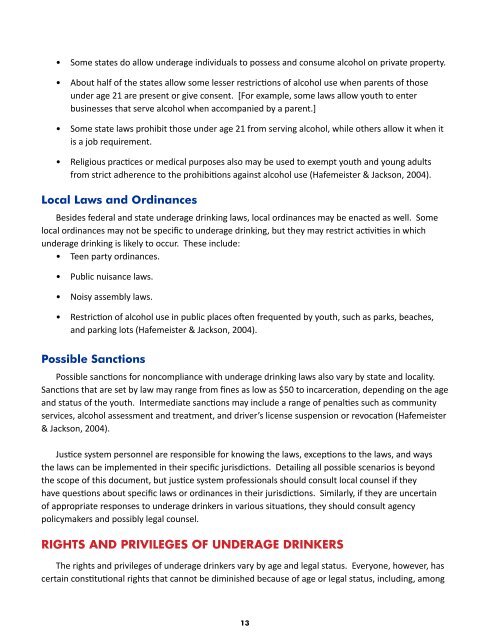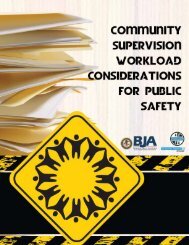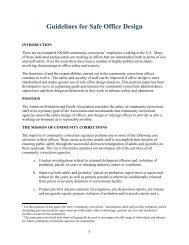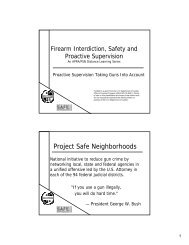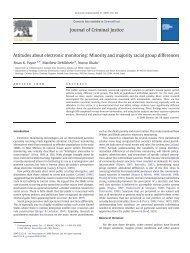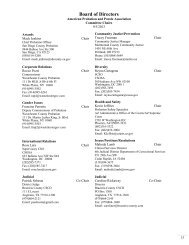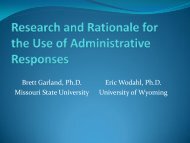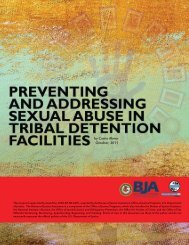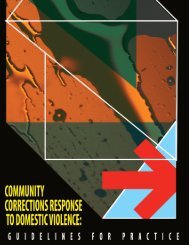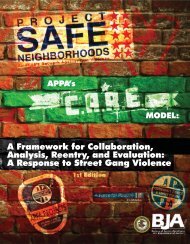Intervention Principles and Practice Guidelines for - Underage ...
Intervention Principles and Practice Guidelines for - Underage ...
Intervention Principles and Practice Guidelines for - Underage ...
You also want an ePaper? Increase the reach of your titles
YUMPU automatically turns print PDFs into web optimized ePapers that Google loves.
• Some states do allow underage individuals to possess <strong>and</strong> consume alcohol on private property.<br />
• About half of the states allow some lesser restrictions of alcohol use when parents of those<br />
under age 21 are present or give consent. [For example, some laws allow youth to enter<br />
businesses that serve alcohol when accompanied by a parent.]<br />
• Some state laws prohibit those under age 21 from serving alcohol, while others allow it when it<br />
is a job requirement.<br />
• Religious practices or medical purposes also may be used to exempt youth <strong>and</strong> young adults<br />
from strict adherence to the prohibitions against alcohol use (Hafemeister & Jackson, 2004).<br />
Local Laws <strong>and</strong> Ordinances<br />
Besides federal <strong>and</strong> state underage drinking laws, local ordinances may be enacted as well. Some<br />
local ordinances may not be specific to underage drinking, but they may restrict activities in which<br />
underage drinking is likely to occur. These include:<br />
• Teen party ordinances.<br />
• Public nuisance laws.<br />
• Noisy assembly laws.<br />
• Restriction of alcohol use in public places often frequented by youth, such as parks, beaches,<br />
<strong>and</strong> parking lots (Hafemeister & Jackson, 2004).<br />
Possible Sanctions<br />
Possible sanctions <strong>for</strong> noncompliance with underage drinking laws also vary by state <strong>and</strong> locality.<br />
Sanctions that are set by law may range from fines as low as $50 to incarceration, depending on the age<br />
<strong>and</strong> status of the youth. Intermediate sanctions may include a range of penalties such as community<br />
services, alcohol assessment <strong>and</strong> treatment, <strong>and</strong> driver’s license suspension or revocation (Hafemeister<br />
& Jackson, 2004).<br />
Justice system personnel are responsible <strong>for</strong> knowing the laws, exceptions to the laws, <strong>and</strong> ways<br />
the laws can be implemented in their specific jurisdictions. Detailing all possible scenarios is beyond<br />
the scope of this document, but justice system professionals should consult local counsel if they<br />
have questions about specific laws or ordinances in their jurisdictions. Similarly, if they are uncertain<br />
of appropriate responses to underage drinkers in various situations, they should consult agency<br />
policymakers <strong>and</strong> possibly legal counsel.<br />
Rights <strong>and</strong> Privileges of <strong>Underage</strong> Drinkers<br />
The rights <strong>and</strong> privileges of underage drinkers vary by age <strong>and</strong> legal status. Everyone, however, has<br />
certain constitutional rights that cannot be diminished because of age or legal status, including, among<br />
13


